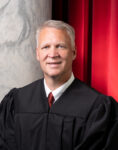ELKVIEW, W.Va. — Nearly 200 students were hearing oral arguments from West Virginia Supreme Court of Appeals cases as part of a civics education program that teaches young people about the appellate court process.
The five state supreme court justices took the program, Legal Advancement of West Virginia Students, or the LAWS program, to Herbert Hoover High School Wednesday. There, the students got to watch the attorneys argue a total of four oral arguments and then ask questions about the process following each argument docket.
Students from not only Herbert Hoover High, but Capital High School, Roane County, and Sissonville High School attended the program Wednesday.

Supreme Court Chief Justice Tim Armstead said he thinks it’s a very important process for students to get to see regarding how the court system functions.
“It explains how the process works, not only for those who might want to go into the law as a profession, but for all students, as they can understand their rights and how the court system works to protect those rights,” said Armstead.
Justice Haley Bunn agrees, it’s enlightening for young people to see the process first-hand.
“You know, they are seeing real arguments and they are seeing government work, they’re seeing the judicial branch work,” she said. “I think in order to foster respect for how the government works, it’s a really good thing to see it.”
Armstead said Wednesday’s cases are actually currently ongoing, and the court will issue an opinion before the end of this term, so the students will get to see how the cases came out.
The four cases the students were getting to observe Wednesday included the following:
. Sandy K. Hayes v. Kanawha Valley Regional Transportation Authority, a political subdivision, and John Doe, an employee of Kanawha Valley Regional Transportation Authority
. Tony Paletta v. Nelson Phillips, III, Nathan Phillips, Robert Nelson Phillips, II and West Virginia Department of Transportation, Division of Highways
. Hansen-Gier Family Trust v. R. Michael Haywood and Joann T. Haywood
. And Todd Kent, Mark Spessert, Christopher Kutcher, City of Charles Town, Bradley Meacham, Glenna Hosby-Brown, William Roper and City of Ranson v. Christopher Sullivan
Armstead said the students were briefed by the lawyers or judges in the cases ahead of time and then briefed again by the lawyers arguing the cases after the fact.
Halie Goodwin is a senior at Roane County High School. She said it was very interesting to see, because she had never witnessed a real court case in action.
“It was kind of cool to see the process, because, I’ve never actually been around that type of stuff, so it was really cool to see how the process goes down,” said Goodwin.
She said it wasn’t like anything shown on television which appears more dramatic, adding that this felt more like the real-deal.
“I feel like the most interesting thing was watching them come up with answers on the spot, because, the judges would ask them random questions and you could kind of tell that they would hesitate a little bit, but then they would like pick it up and they would do really, really good,” said Goodwin.
Another senior at Roane County High, Cloey Helmick agreed.
“It’s a lot more realistic with how your lawyers were stuttering a little bit and they weren’t queued on exactly what to say,” Helmick said.
Justice Bunn said she hopes that seeing the cases be argued is inspiring to the students to consider going into a law career later down the road, or in public service in any capacity.
She said she knows from her own personal experience growing up and getting to go on capitol visits, that having access to governmental processes at an early age played a crucial role in inspiring her to go into law as a career.

“Things that you can do in West Virginia that you might not be able to do in larger places inspired me to get into public service,” said Bunn. “We have groups into the courtroom all of the time, we go to schools, we have real arguments at schools like we’re doing today, outreach is just really important.”
Over 7,000 students across 37 counties have taken part in LAWS since it was established in 1999.
Armstead said he believes the program has been very well-received by students throughout the years.
“We always enjoy having conversations with the students afterwards, we can’t really talk about those cases specifically, but we can talk about how the court works, and we’re looking forward to answering questions that they want to ask us, and just interact with the students,” said Armstead.
This made the second time students from Kanawha and Roane counties got to participate in the program.


